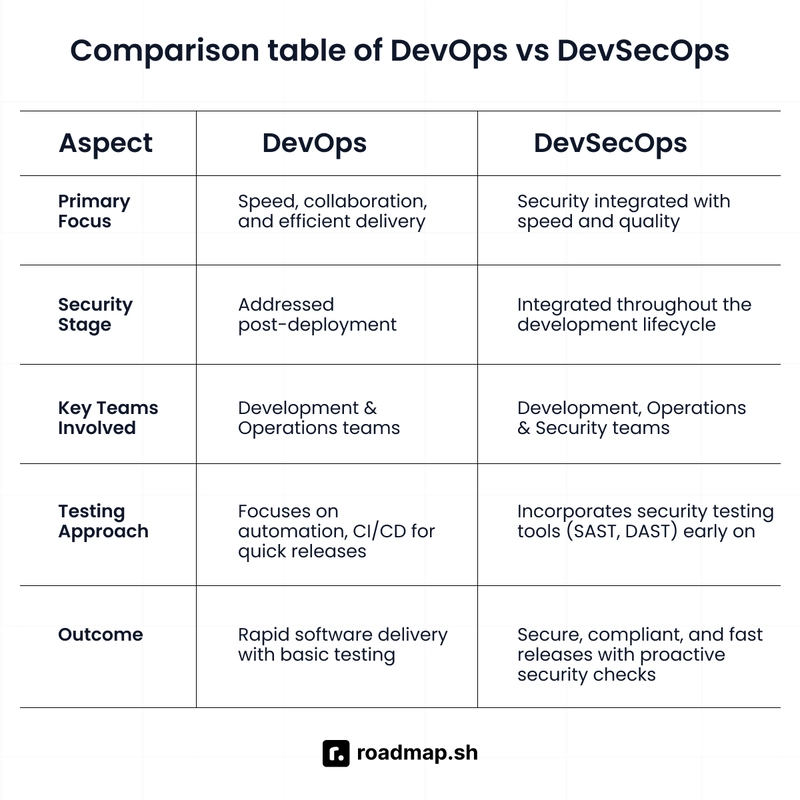Do you know the difference between DevOps and DevSecOps?
DevOps focuses on streamlining the development and operations lifecycle to deliver software quickly. Meanwhile, DevSecOps integrates security practices into the DevOps pipeline, prioritising security from the start and throughout the entire development process.
In this blog, you will learn about the primary purpose and role of DevOps and DevSecOps. Here is a short comparison of the two:
DevOps vs DevSecOps: How are they different?
Choosing between DevOps and DevSecOps can determine whether your software is fast or secure.
While both approaches aim to enhance collaboration and efficiency in software development, DevSecOps incorporates security practices early in the development cycle, unlike DevOps, which often addresses security issues later.
DevOps primarily focuses on improving collaboration between design, development, and operations teams to speed up software delivery. The core idea is to remove bottlenecks and inefficiencies in the development pipeline.
On the other hand, DevSecOps integrates cybersecurity practices throughout the development process. This approach addresses increasing cyber threats by embedding security checks at every phase of the software development lifecycle (SDLC).
How do DevOps and DevSecOps affect business goals?
DevOps and DevSecOps affect key business goals, such as time to market, customer satisfaction, operational efficiency, and risk management. Here’s how they affect these goals.
Time to market
DevOps speeds up product delivery by automating workflows, removing bottlenecks and enabling faster iterations. DevSecOps puts the necessary checks in place without derailing development timelines so businesses can maintain a regular release cadence and meet market demand.
Customer satisfaction
DevOps delivers frequent updates and new features to meet customer demand and improve user experience. DevSecOps builds on this by providing secure and reliable products, reducing the risk of issues that frustrate users. Both speed and reliability increase customer trust and loyalty.
Operational efficiency
DevOps makes tasks more efficient by eliminating duplication and manual intervention. DevSecOps adds to this by addressing risks early and avoiding rework or operational downtime. Together, they reduce development costs and increase productivity.
Risk management
DevOps allows for faster iterations and deployments, which can introduce risks if not appropriately managed. DevSecOps mitigates these risks by making security a core part of the development lifecycle. This proactive approach reduces the chance of breaches or compliance issues and protects the business’s reputation and financials.
Moving from DevOps to DevSecOps
The shift from DevOps to DevSecOps is a critical evolution for organisations aiming to integrate security seamlessly into the development lifecycle.
Before implementing, understand your goals and what you want to achieve or solve, and choose the right automation tool if workflow efficiency is an issue. It helps reduce manual tasks, run faster code reviews, perform security tests, and provide quick deployment. It is also important to train your teammates about the new model or practice.
If you want additional information on the topics, including in-depth details, challenges, tools, insights, and more, check out this article by Roadmap.

Tidak ada komentar:
Posting Komentar